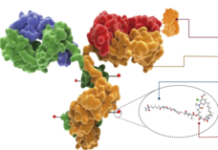The UK and Australian researchers used strain-resolved metagenomic classification to discover a signature of 22 gut microbial strains associated with response to combination of ipilimumab plus nivolumab in a phase II CA209-538 study cohort of 106 Australian patients with different types of rare cancers.
This represents the largest gut microbiome study of patients treated with combination immune checkpoint blockade published to date. The findings are reported by Ashray Gunjur and Trevor D. Lawley of the Host–Microbiota Interactions Laboratory, Wellcome Sanger Institute in Hinxton, UK and colleagues on 1 March 2024 in the Nature Medicine.
Combination immune checkpoint blockade targeting both PD1 and CTLA4 has demonstrated synergistic antitumour activity preclinically and is now an approved standard of care for patients with different cancer types, including melanoma, clear-cell renal cell carcinoma, non-small cell lung cancer, mesothelioma and hepatocellular carcinoma. However, unpredictable nature of responses is seen in 20-60% of patients across these cancer indications and the more frequent severe immune-related adverse effects experienced with combination immune checkpoint blockade when compared to anti-PD1 or anti-PD-L1 monotherapy.
Currently approved tumour-agnostic biomarkers for PD1 blockade include tumour mutational burden and mismatch repair deficiency; however, both have limitations and rely on available, contemporaneous tumour tissue. The authors wrote in the background that a promising tumour-extrinsic avenue for predicting immune checkpoint blockade response and/or toxicity a priori is assessing a patient’s baseline gut microbiome composition, referring to the community of microbiota, predominantly bacteria, resident within the gastrointestinal tract.
Culture-free methods to taxonomically profile foecal microbiomes have progressed from low-resolution 16S rRNA gene sequencing to high-resolution shotgun metagenomics, with studies of clinical cohorts finding associations between baseline Akkermansia muciniphila in lung cancer and Faecalibacterium prausnitzii in melanoma foecal abundances and tumour responses among patients receiving anti-PD1. Previous meta-analyses across metagenomic studies have found limited reproducibility of these candidate microbial biomarkers for response to immune checkpoint blockade.
Although this poor reproducibility may be partly attributable to methodological or geographic differences between studies, the study team hypothesized that species-level taxonomic biomarkers may lack the precision necessary to capture the specific microbial traits associated with response to immune checkpoint blockade or non-response. They performed a deep shotgun metagenomic sequencing of baseline foecal samples from a richly annotated phase II study cohort of patients with different rare cancers treated with combination immune checkpoint blockade.
The study team demonstrated that strain-resolved microbial abundances improve machine learning predictions of response to immune checkpoint blockade and 12-month progression-free survival relative to models built using species-rank quantifications or comprehensive pretreatment clinical factors.
Through a meta-analysis of gut metagenomes from a further six comparable studies used as a validation cohort, they found cross-cancer and cross-country validity of strain–response signatures, but only when the training and test cohorts used concordant immune checkpoint blockade regimens (anti-PD1 monotherapy or combination of anti-PD1 plus anti-CTLA4). This suggests that future development of gut microbiome diagnostics or therapeutics should be tailored according to immune checkpoint blockade treatment regimen rather than according to cancer type.
The authors underlined that their work provides several readily implementable insights to help future research and development in this field. It highlights the added value of strain resolution in developing gut microbial immune checkpoint blockade biomarkers and suggests that strain signatures may be generalizable across cancer types and geographic locations, supporting investment in developing ‘pan-cancer’ gut microbial diagnostics and/or therapeutic immune checkpoint blockade adjuncts. The distinct performance of combination immune checkpoint blockade and anti-PD1 gut microbial signatures suggests disaggregating these regimens in future analyses to define the relationships between gut microbiota and immune checkpoint blockade more precisely in a regimen-specific fashion.
CA209-538 is an investigator-initiated study funded by an investigator-initiated research grant provided by Bristol Myers Squibb Ltd. Australia and an Australian Commonwealth Government Medical Research Futures Fund-accelerated research grant. This work was supported by the Wellcome Trust and Cancer Research UK.
Reference
Gunjur A, Shao Y, Rozday T, et al. A gut microbial signature for combination immune checkpoint blockade across cancer types. Nature Medicine; Published online 1 March 2024. DOI: https://doi.org/10.1038/s41591-024-02823-z






